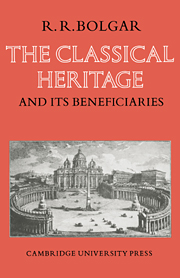Book contents
- Frontmatter
- Contents
- Preface to 1973 impression
- Introduction
- Chapter I The Background
- Chapter II The Greek East
- Chapter III The Carolingian Age
- Chapter IV The Pre-scholastic Age
- Chapter V The Scholastic Age
- Chapter VI Collapse and New Beginnings
- Chapter VII The High Renaissance
- Chapter VIII The End of the Renaissance and the Appearance of New Patterns in Classical Education and Scholarship
- Chapter IX Education and the Classical Heritage
- Notes
- Appendix I Greek MSS. in Italy during the Fifteenth Century
- Appendix II The Translations of Greek and Roman Classics before 1600
- Index
Preface to 1973 impression
Published online by Cambridge University Press: 29 January 2010
- Frontmatter
- Contents
- Preface to 1973 impression
- Introduction
- Chapter I The Background
- Chapter II The Greek East
- Chapter III The Carolingian Age
- Chapter IV The Pre-scholastic Age
- Chapter V The Scholastic Age
- Chapter VI Collapse and New Beginnings
- Chapter VII The High Renaissance
- Chapter VIII The End of the Renaissance and the Appearance of New Patterns in Classical Education and Scholarship
- Chapter IX Education and the Classical Heritage
- Notes
- Appendix I Greek MSS. in Italy during the Fifteenth Century
- Appendix II The Translations of Greek and Roman Classics before 1600
- Index
Summary
The twenty years which have passed since this book was written have done much to make the history of the classical tradition a more inviting field of research. The basic information, on which the historian of classical survivals so largely depends, has continued to accumulate. The Institut de Recherche et d'Histoire des Textes, B. Bischoff, P. O. Kristeller, Giuseppe Billanovich and his collaborators in the Italia medievale e umanistica, L. D. Reynolds writing on Seneca's letters and G. Zuntz on Euripides have established the provenance and fortunes of a great many manuscripts. L. D. Reynolds and N. G. Wilson have given us in Scribes and Scholars an excellent short guide to the transmission of ancient literature before the invention of printing. Many early catalogues and book-lists, many medieval and renaissance texts have appeared in convenient modern editions, among which special mention should perhaps be made of that noble work in progress, the new Erasmus; and a growing body of monographs, whose findings still await tabulation, have added to our knowledge of what was translated from Greek into Latin, from Latin into the vernaculars. The student who takes up the subject to-day has more adequate tools at his disposal than his predecessors had a generation ago.
Advances have also been made in certain specialised areas. In the medieval period, C. Mohrmann has made a start with a much-needed analysis of Christian Latin usage. B. Bischoff, L. Bieler, P. Riché have gone some way to rescue the history of Irish scholarship from the realm of legend.
- Type
- Chapter
- Information
- The Classical Heritage and its Beneficiaries , pp. vii - viiiPublisher: Cambridge University PressPrint publication year: 1973



